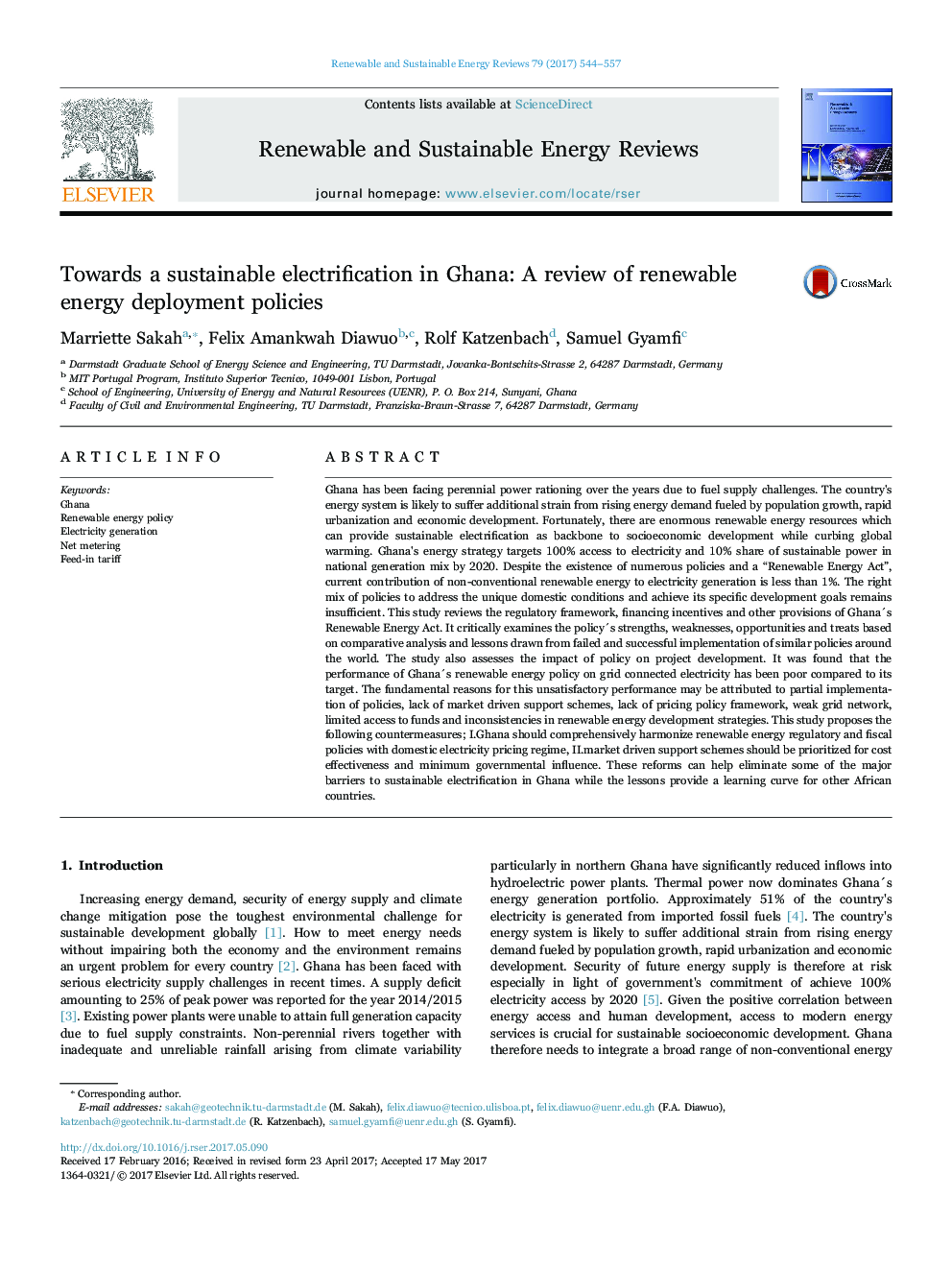| کد مقاله | کد نشریه | سال انتشار | مقاله انگلیسی | نسخه تمام متن |
|---|---|---|---|---|
| 5482587 | 1522307 | 2017 | 14 صفحه PDF | دانلود رایگان |
عنوان انگلیسی مقاله ISI
Towards a sustainable electrification in Ghana: A review of renewable energy deployment policies
ترجمه فارسی عنوان
به سوی برق رسانی پایدار در غنا: بررسی سیاست های بازپرداخت انرژی است
دانلود مقاله + سفارش ترجمه
دانلود مقاله ISI انگلیسی
رایگان برای ایرانیان
کلمات کلیدی
غنا، سیاست انرژی تجدید پذیر، تولید برق، اندازه گیری خالص تعرفه خوراک،
موضوعات مرتبط
مهندسی و علوم پایه
مهندسی انرژی
انرژی های تجدید پذیر، توسعه پایدار و محیط زیست
چکیده انگلیسی
Ghana has been facing perennial power rationing over the years due to fuel supply challenges. The country's energy system is likely to suffer additional strain from rising energy demand fueled by population growth, rapid urbanization and economic development. Fortunately, there are enormous renewable energy resources which can provide sustainable electrification as backbone to socioeconomic development while curbing global warming. Ghana's energy strategy targets 100% access to electricity and 10% share of sustainable power in national generation mix by 2020. Despite the existence of numerous policies and a “Renewable Energy Act”, current contribution of non-conventional renewable energy to electricity generation is less than 1%. The right mix of policies to address the unique domestic conditions and achieve its specific development goals remains insufficient. This study reviews the regulatory framework, financing incentives and other provisions of Ghana´s Renewable Energy Act. It critically examines the policy´s strengths, weaknesses, opportunities and treats based on comparative analysis and lessons drawn from failed and successful implementation of similar policies around the world. The study also assesses the impact of policy on project development. It was found that the performance of Ghana´s renewable energy policy on grid connected electricity has been poor compared to its target. The fundamental reasons for this unsatisfactory performance may be attributed to partial implementation of policies, lack of market driven support schemes, lack of pricing policy framework, weak grid network, limited access to funds and inconsistencies in renewable energy development strategies. This study proposes the following countermeasures; I.Ghana should comprehensively harmonize renewable energy regulatory and fiscal policies with domestic electricity pricing regime, II.market driven support schemes should be prioritized for cost effectiveness and minimum governmental influence. These reforms can help eliminate some of the major barriers to sustainable electrification in Ghana while the lessons provide a learning curve for other African countries.
ناشر
Database: Elsevier - ScienceDirect (ساینس دایرکت)
Journal: Renewable and Sustainable Energy Reviews - Volume 79, November 2017, Pages 544-557
Journal: Renewable and Sustainable Energy Reviews - Volume 79, November 2017, Pages 544-557
نویسندگان
Marriette Sakah, Felix Amankwah Diawuo, Rolf Katzenbach, Samuel Gyamfi,
